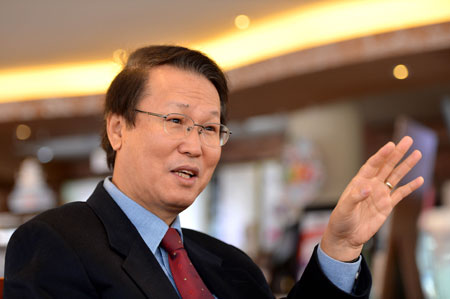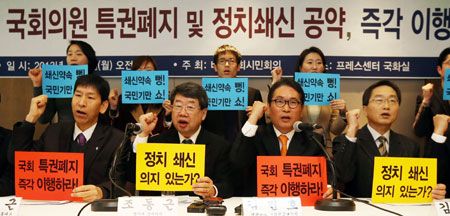
Washington expected to use Seoul in axis against Beijing
Following leadership changes in the two dominant powers ― the United States and China ― nations are seeking to adjust their foreign policies between the two, and South Korea is not an exception.
Many experts say the politics of the two giants will dominate and dictate security conditions on the Korean Peninsula which is expected to have more competition than cooperation as Washington seeks to re-allocate military resources to Asia as part of its policy to contain China’s rise. This signals an unwelcoming security environment for Seoul.
Shin Jung-seung, former South Korean ambassador to China and director of Chinese Studies Center at the Korean National Diplomacy Academy, however, disagreed with such a view. He said Seoul can play a “proactive role” between the two and even induce the rival powers to cooperate.
“Seoul can take on a key role in improving the Washington-Beijing ties by actively participating in global issues that are of common interest to both the U.S. and China. Maintaining peace and stability on the Korean peninsula is one of them,” said Shin during an interview with The Korea Times on Nov. 23. “Korea is not a weak nation as it was during the 19th century. It has gained economic power and can let its voice be heard on the world stage. In light of this perspective, the U.S. and China are actually competing to bring South Korea over to their sides.”
The former ambassador said the U.S. is and will make more efforts to get South Korea involved in its blueprint over the so-called “pivot to the Asia-Pacific” to balance Japan’s decline of power in Northeast Asia realizing South Korea’s growing influence in the region.
Washington has continuously asked South Korea to participate in its regional missile defense system, or the MD, which Seoul has refused.
According to Shin, South Korea is a geo-politically important state for China as well because it is striving to achieve economic development in the guise of a global friendly approach namely the “peaceful rise.” Stability on the Korean peninsula is one of the most important conditions for China to achieve the goal.
“Seoul doesn’t have to be dragged around by U.S. and China, instead, should act wisely and actively to coordinate the two, especially, regarding regional issues,” Shin said.
The director also added since politics in the U.S. and China are largely focused on domestic issues, it will offer more room for South Korea to take the initiative in boosting security in the region.
ROK-U.S. alliance
In line with this view, Shin said strengthening the ROK-U.S. alliance is important for Seoul to boost its security but warned it should not develop in the direction of targeting China.
“China is not against the ROK-U.S. alliance itself but it is complaining about the alliance from the anxiety that it might target China,” Shin said.
The ROK-U.S. alliance, forged in 1953 against the backdrop of the Korean War (1950-1953), long served as the cornerstone for South Korea’s security in deterring possible military provocations by North Korea.
The treaty allows U.S. forces to be stationed in South Korea. The U.S. currently has around 28,500 troops here.
However, following the U.S. shift to Asia, Beijing began to consider a U.S. military presence in South Korea as a threat since in the event of Korean unification China could confront the U.S. Army face-to-face on its eastern border.
The mutual self-defense treaty between the two allies established legal grounds for the U.S. military to intervene in the event of North Korean aggression.
“So to say, when upgrading the bilateral alliance, South Korea should keep in mind to limit the scope of the concept of peace and stability on the Korean Peninsula,” Shin said. “Unlike the U.S.-Japan alliance, the ROK-U.S. one didn’t have the purpose of targeting a third nation from the very beginning. Seoul should prioritize its own national interests.”
Regarding Foreign Minister Kim Sung-hwan’s recent proposal for launching Seoul-Washington-Beijing talks in dealing with North Korea issue, the former ambassador said such a move has been discussed among South Korean and Chinese scholars while he was serving as ambassador in 2008.
“The trilateral talks have not been officially institutionalized yet,” Shin said. “But the discussions took place and it could serve as the foundation for launching the talks after the next president of South Korea takes office.”
China’s intervention
Unlike some experts voicing concern over China’s possible intervention in the case of North Korea’s regime collapse, Shin argued that China will not do so because it is against its core national interests.
“It is not easy for China to intervene in the event of a North Korean crisis,” Shin said. “If China intervenes, it cannot block other nations from interfering in its own domestic issues such as the problem of Taiwan. China thinks of unification with Taiwan as its core interest.
Beijing has long pursed the “principle of non-interference” as it seeks to be reunited with Taiwan. Washington, while recognizing mainland China’s legitimacy to represent the two Chinas, still has a robust military relationship with Taiwan.
“Keeping in mind China’s support for the principle of non-interference, China would not try to intervene in the Korean peninsula,” said Shin. “China will prefer a multi-lateral approach with the U.S. involved.”
In addition, the director pointed out that its relationship with South Korea is already too intimate for China to risk it.
“Human exchanges and trade exchanges have grown so much in recent years and will keep growing in the future as well,” Shin said. “China will not want to give away such exchanges by intervening in other nation’s issues.”
Who is Shin Jung-seung?
Shin Jung-seung, 60, a career diplomat, served as South Korean ambassador to China from May 2008 to December 2009.
After joining the Ministry of Foreign Affairs and Trade (MOFAT) in 1975, Shin assumed posts in relation to China and Japan and is known as a Northeast Asia expert.
He was in charge of hands-on work when South Korea established diplomatic relations with China in 1992. He was the director of Northeast Asia Division 2 at MOFAT during that time.
He also served as a councilor at the Korean Embassy in Japan.
Before being appointed as ambassador to China, Shin was also an ambassador to New Zealand from 2004 to 2006.
He now serves as director of the Chinese Studies Center at the state-run Korean National Diplomacy Academy.
Shin graduated from Seoul National University with a degree in diplomacy. <The Korea Times/Chung Min-uck>




